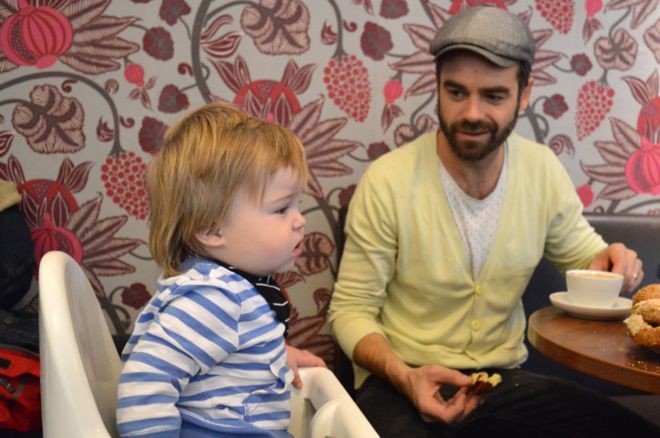In some countries the idea of paternity leave - when a father takes time off work to stay at home with a new child - has yet to take hold. In Sweden, which has been encouraging fathers to take paternity leave since 1974, there is now a new incentive for them to spend a full three months at home.
"It took 20 minutes to get the kids into their winter clothes this morning," says Fredrik Casservik (above), putting his son, Elton, into a high chair. Next to him, another dad, Rikard Barthon, agrees. "It's the worst time of year," he says, as he carefully helps his 16-month-old daughter, Juni, out of her padded onesie.
The two dads are in a suburban cafe in southern Stockholm drinking coffee and sharing cinnamon buns with their children. They discuss how to spend the afternoon while their toddlers wave enthusiastically at two more small children at the next table.
Groups of fathers lunching together surrounded by toddlers or pushing prams through parks are not an uncommon sight in Sweden. In 1974, the country was the first in the world to replace maternity leave with parental leave, giving both partners the chance of time at home with their children.
"It's a very strong tradition here," says Roger Klinth, a researcher and senior lecturer in gender studies at Linkoping University. "That all political parties voted for it in 1974, was a clear signal from the state that men and women should have the same status as parents and that one gender shouldn't take main responsibility."
The idea was that couples got six months' leave per child with each parent entitled to half the days each. However, men had the option of signing their days over to the women - and most of them did. As a result, two decades later, 90% of the leave days were still being used by women.
A "daddy quota" was introduced in 1995 to resolve this. It allocated 30 days' leave solely to the father on a use-it-or-lose-it basis. If the father didn't take a month off work, then the couple as a whole would lose a month's paid leave. In 2002, this was extended to 60 days. Both reforms had a direct impact on the proportion of leave taken by the father so that by 2014 men were taking 25% of all the days available to the couple. As of 1 January this year, the quota has risen to 90 days.
Today, Swedish couples get around 16 months (480 days) paid parental leave when their child is born. For the first 390 days, the parent who is off work gets paid 80% of their salary by the state. After that, parents can take up to 90 days more leave and be paid a lower rate. As a result of the latest changes the maximum amount of leave a mother can take has gone down from 420 days to 390 - or from roughly 14 months to 13.
Rikard is 41 and works at TV network TV4 and Fredrik, 40, is an advertising agency graphic designer. Both are taking at least four months' leave.
There are Facebook groups that help dads on paternity leave meet up with other fathers. While the children play, the dads have coffee or lunch together and exchange stories and childcare tips just as their own mothers once did.
Fredrik's wife Susanne has noticed that Elton has become more attached to his dad since she went back to her job at a recruitment company.
"I'm a bit sad sometimes when I can see that Elton wants to be with Fredrik, but I know it's because they're home together more," she says. "But then it can be a bit hard for Fredrik when the children want to be with him all the time as well!"
Things were very different for Fredrik's father, Jan Casservik, in 1975. He only took a few days' leave from being a head teacher when Fredrik was born, although by law he could have taken more.
"It wasn't that common back then. If someone did take leave, it was almost a bit suspect. It just wasn't what you did as a man," he says.
"Being at the birth was OK, but you wouldn't be home forever. If I had small kids today like Fredrik, then I'd definitely like to be home and take paternity leave."
His wife, Margareta, agrees. She took all of the parental leave when they had their three children and thinks it's brilliant to now see Fredrik spending time with his two children. "The experience that he's getting when the children come to him is something I felt many times and it's such a lovely feeling. I think everyone should experience it."
Fuente: www.bbc.com
